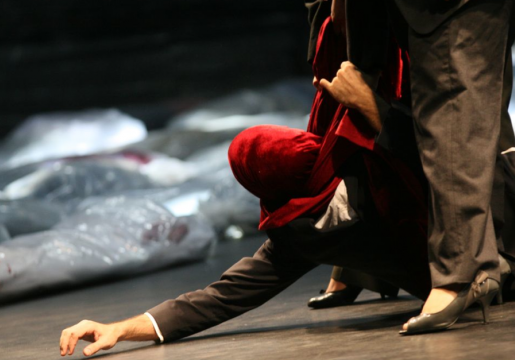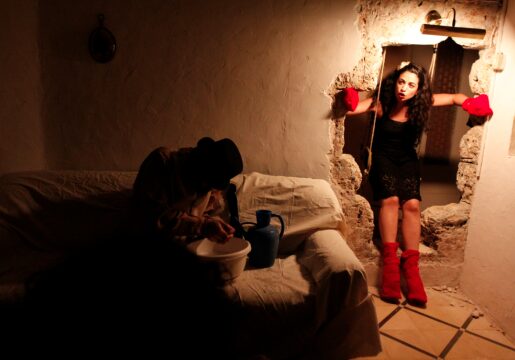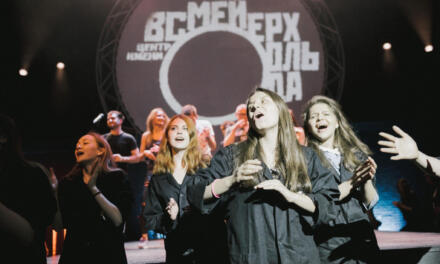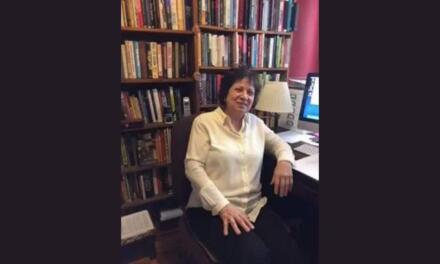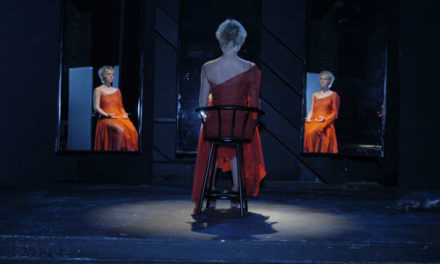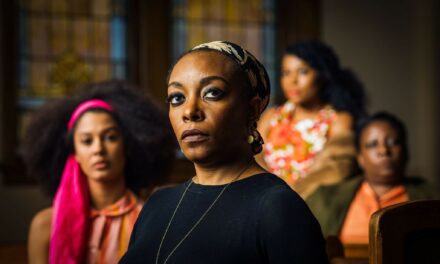Based in Beirut, Zoukak Theatre Collective and Cultural Association was established in 2006, and has worked to find new ways of collective creation since its inception. Drawing from an understanding of theatre as collective work done by diverse individuals, Zoukak has applied theatre on various levels – social, psychological, and educational – giving workshops and training sessions and devising performances in different Lebanese regions and in various contexts, finding ways to connect social interventions with artistic investigations. This conversation with Maya Zbib, a founding member of Zoukak, talks about working with marginalized communities, broadening Lebanese audiences for performance, and the precarious conditions of Zoukak’s labour.
Amal Khalaf: Firstly, how did you come to work in theatre?
Maya Zbib: I started doing theatre 19 years ago, before university. At the Lebanese American University (LAU), which used to be called Beirut University College (BUC), they often had student productions that I would go to. We had an informal company at my high school, which was not part of school but that we put together ourselves and we put on a show every year. I had always been interested in theatre because it is a place where you can say things that you can’t say elsewhere. So as a teenager it was just amazing.
AK: What kinds of things could you say or do?
MZ: It was the excuse to be someone else and, through that, actually be yourself. Now my relationship to theatre is more complex, but initially, it was about having this device to say things that you do not or can not even think of expressing – to express viscerally or elucidate things that are not easily expressed otherwise.
University was a crazy place but a very creative space. It was so restrictive and through that restriction, you have to find solutions. The old LAU arts building had an underground theatre, which was very damp and small with no resources. We were crammed into these small rooms with our teachers smoking.
AK: Do you have any role models or movements that you look up to, either now or when you started?
MZ: The history of theatre in Lebanon is quite young. Of course, there were a lot of experiences with theatre in the 1800s that were imported, but the whole issue of origin and identity for me is not so interesting. There is no real history of performing arts that comes from Lebanon compared to India, for example, and you can see that with the audiences. Zoukak recently performed at the International Theatre Festival of Kerala and you can feel that the way people look at performing arts is very different – they have a long history of looking, decoding and understanding form, movement and spatial interaction that we do not have as part of our cultural heritage here in Lebanon. Of course, there is a cultivated elite that we tend to address but we want to address other communities too and this is part of our mission with Zoukak. Our shows travel around the country and we sometimes have very strange responses – they are very interesting, naturally, but they come from an absence of a culture for reading and understanding performing arts. We went into a school once and the students did not know that they should clap at the end of the show – these kinds of small codes that come with watching a performance. This does not mean that it affects the work, but generally, there are few productions here and so audiences do not get to see many performances. But the history of storytelling, narrating, poetry, and of oratory is something that is very present in the region. Telling something directly and being political about it is something that people are good at here and we try to use it in our work.
AK: When I heard about Zoukak I was struck by the variety of audiences you develop work with and perform for. When I do political theatre work, I tend to be guarded about for whom we perform as concerns often arise around representation and power. How does your work shift between the ‘elite audiences’ you mention and other audiences? Where and for whom do you perform?
MZ: We try not to address different audiences differently and we try to create work that is accessible for everybody. Our work is experimental – we don’t present linear narratives so already there may be a structure that not everybody understands. But we try to have an accessible discourse or to have something that the audience can follow. We have an awareness around language and we tend not to speak in a very elevated tongue.
However, our first collaboration was Hamletmachine (1977) by Heiner Muller. It is the opposite of what we are doing right now but it was the start of our collaborations. We threw ourselves into a collective dramaturgy and translation from English and performed it in literary Arabic. Originally, Muller condensed 300 pages into nine so it is very dense. One sentence from his text would have seven references in it and with every sentence each one of us had issues – we were translating and arguing, writing and rewriting over and over again shouting ‘I cannot say this’ or ‘my feminism does not allow it!’ This was the first show of the company. Half of the audience hated it.
AK: When was this performed?
MZ: In the end, we performed four versions from 2008 through to 2010. Some people really hated it while others fell in love with us and said, ‘You have brought back theatre!’ It was then that we decided a project like Hamletmachine was too heavy and referential. But it is based on Hamlet, so it is about positioning yourself politically – this is how we interpreted it for the performances. And this was what we took forward and it really set our way of working as a company, producing collectively and committing to the idea of the actor holding a discourse and taking position in front of an audience.
AK: Tell me more about taking a position – in what sense do you mean?
MZ: Even when we work with other people we try to lead them towards taking a position on the material they are using. The actors hold the whole discourse of the play and we would never tell them what their role is or what to say. This is not just in community-based work – for example, I had a project in Germany with a city theatre’s ensemble of actors. One of them did not feel right about the text of Mahmoud Darwish because she could not be on the side of the Palestinians. I would discuss the text again and again with her so that she could find her own discourse and fit it into the dramaturgy of the performance and, in the end, the work lead her to change her perspective. This idea of position came out of Zoukak’s first collaboration, but at the same time, we decided that we could not have overly heavy intellectual language that nobody understands and that we could loosen up a bit. So we went around and started looking into local stories and our heritage of storytelling, playing with words, singing, rhyming, and writing verse. This became one of our trademarks.
This new use of language started with one of the shows that I directed, Silk Thread (2012), a site-specific performance set in a building that moves from one room to another. The performance is about gender dynamics and how these are shaped through archetypal stories. One of the stories is Little Red Riding Hood but told through the story of a girl who was raped as she was hitchhiking. Throughout the play we used playful language that is very local and musical as well.
We began to understand how we could create work that is accessible and that people can understand without necessarily debasing the work or making it silly or less intellectual. It created a link with people who may or may not be knowledgeable about the history of theatre, art or philosophy.
AK: Zoukak began in 2006 – how did you start working together? I was thinking about this idea of urgency and need in that moment in Beirut and how, for Zoukak, this became a call to rethink what performance could be – to produce another way of working or a different kind of work. It was as if there were other forces bringing you together.
MZ: Absolutely. Activist and playwright Junaid Sarieddine and theatre therapist Lamia Abi Azar had already starting thinking about creating a company and were starting to write some things. At the same time, I was working with producer and production manager Abla Khoury, who was creating a show to perform during the Israeli war to families displaced and living in school buildings. I invited Junaid and he invited Lamia and we started working together. After that, we were doing more drama therapy because Lamia had developed a technique in Italy. After the war, we did a lot of projects on a consultant basis with Handicap International, a charity that helps vulnerable populations and people with disabilities. This work kept Zoukak running and helped us cover some of the rent for our studio (which we still have today), which we needed so that we could rehearse somewhere. Just when we began working together, the 2007 war in the Beddawi camp in northern Lebanon broke out. By then we were doing drama therapy in many contexts.
AK: What is this school of therapy?
MZ: In theory, it is very simple – it borrows elements from experimental theatre and is applied in a clinical psychology frame. It’s about having a safe space, with rules about the space, the time, the group, and oneself, and allowing everybody to express themselves, respecting the freedom of others and everyone. These are very simple rules but are applied rigorously. We have been working in different contexts and have had amazing experiences, for example with Kafa (Enough Violence and Exploitation, an NGO in Beirut against domestic violence) where we created two shows It’s Time to Scream (2011) and Nes Bsamne w Nes Bzet (2012).
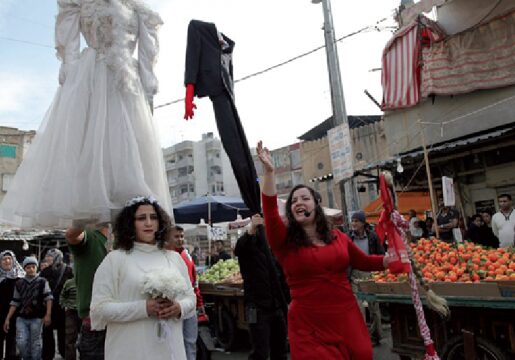
Nes Bsamne w Nes Bzet. Zoukak Theatre Collective and Cultural Association, 2012. Photo credit Randa Mirza
AK: When you are working with communities and organizations do you work with everyone, including both adults and children?
MZ: Lamia works with children who have multiple disabilities at the Mar Elias refugee camp, with the Ghassan Kanafani Cultural Foundation. In 2006 and 2007 we worked with children a lot and after the war, we did events in schools. We have also worked with youths in prisons. We have done so much of this kind of work but don’t publicize it because it is a delicate issue. Sometimes it is unethical to expose certain stories or talk about certain cases. We do not talk about it much.
AK: This is the safe space you mentioned earlier, but it also involves a balancing between process and theatrical presentation. How do you approach representation and voice? How do you balance collective methodologies in closed workshops with public moments?
MZ: It depends on the process. For example, the women we worked with at Kafa for It’s Time to Scream came without their husbands knowing. Some were afraid of their husbands, but most were also afraid of what society might say. We did workshops over three months. We did not want to put anyone at risk by doing a public performance but in the end they wanted to do it. We debated wearing masks or different costumes with makeup and props to keep everyone anonymous but everybody voted against the idea. They decided that they did not want to cover their faces but that they wanted to face their audience. Another important thing that they decided was in the communication about the show. They wrote, ‘we do not want to be called women who have been subjected to domestic violence. We want to be called women activists for the law against domestic violence.’ It was a breakthrough in the process because they felt that through this work they were able to defend themselves not as victims anymore but as activists. They were able to position themselves however they wanted within the show itself, too. For example, somebody wrote a text to perform – it was an ewiha, a traditional wedding chant – but when she got on stage she just could not say it anymore. These things happen because once you are on stage you have to make a decision – you either say things that you did not want to say before or you just say it’s too much, I do not want to say this. That was a very interesting moment in the performance, when the rest of the group were trying to hold the space for her and supporting her in that moment. They are not trained actresses – we only worked with them for 12 sessions – and they did not know how to ‘fill the void’. But it was about how the space that was created allowed for people to become supportive of each other in that moment.
AK: It’s like the aesthetic space that Augusto Boal describes – the safe space-time of performance. I want to go back to the shift that the woman who ended up not speaking in It’s Time to Sceam had, and the idea of agency, performativity and the political. There are many ways that Zoukak is political – from being an independent theatre company; your choice of collective working and dramaturgy; but also the subjects that you address and the spaces and contexts you perform and do workshops in.
I have been reading different interpretations of Hannah Arendt’s ideas on political action and the ‘space of appearance’ – the relationship between actor and spectators that are constitutive of a public space of appearance where moments of possibility and a political agency can occur. For Arendt, political action requires a speech act in public but in Judith Butler’s essay ‘Bodies in Alliance and the Politics of the Street’ (2011), she broadens the theory of political performativity beyond speech acts to include the actions of the body and political bodies being together in public. For Butler, assemblies of bodies have an expressive dimension that cannot be reduced to speech. There seems to be a political shift in the moments you described where the women from Kafa take control of their representation, from deciding how they are to be named to speaking or not speaking during the performance. It is a moment where you are in two positions: in a collective and also an individual representing or performing yourself. There is a decision to step into the political. Could you say more about stepping into the political and how Zoukak thinks about the political, political action, and performance?
MZ: Yes, this idea about speaking in public and putting your body in a demonstration as opposed to how you put it on stage is something that we are thinking about a lot. Many of the company members are very much involved in the social movements here, especially the recent protest movements of the Arab uprisings. Half of the company were leaders in these movements. It is always a question for us of where performance fits into that activism and how theatre is able to do something different or more, and how we can negotiate those two worlds. When am I an activist? When am I a performer or theatre-maker of a political work? We are more and more convinced that these are two different worlds. We are often asked to perform in demonstrations and we are always reticent. One example that was very successful, however, was the Nes Bsamne w Nes Bzet show with Kafa, about the law against domestic violence, as there had been many atrocious murders of women by their husbands. If you look at the numbers it seems impossible. Here, in Lebanon, there were no laws protecting women against domestic violence because our laws are related to religion. As there is no civil marriage, the law does not deal with the domestic ‘sacred space’. In 2012, we were part of the campaign to change the law. We created a show as a street performance that addressed this issue in a very direct way – I would call this our only activist show. The message was very clear and there was no question about it. We performed it in front of the National Museum in the last demonstration of that campaign – after that, the law came through.
It was great to be in that moment but generally, we feel that political activism and political theatre are two different things and the impact of theatre happens on alternate levels, sending out ripples. It is part of our everyday labor to think about what we are saying and to whom we are saying it. To ask how this is impacting the people around us. It is not just about our community or Lebanon but also about the world. How are we responding to what is happening around us? This is our only way of existing in a place where everything is so segregated and you have to be defined politically and religiously and so on. As citizens, we do not have much space so we feel lucky to have this platform, and we try to use it as best as we can. You try to be smart about it and not to be too sensitive. For example, we play a lot with how not to be censored – we like to play games and take risks.
I think that we treat being on stage as though we are putting ourselves at stake and using our whole history as performers and as people, and the history of text we are performing and the people we are addressing, to say something worthwhile. This is where the political comes in. Being on stage is always like a matter of life and death for us so a lot of people feel like we are too intense.
AK: Emergency agency. And how about the political moments within a workshop?
MZ: I agree, a lot with the idea of the shift in the agency that comes with saying something out loud in public. I work with teenage girls in workshops at universities and you notice how at first their knees are closed together, they do not look you in the eye, and they have their shoulders hunched. At the end of the workshop they are standing tall and saying something out loud – this is a political body already. Working on these small empowering details allows people to voice ideas and emotions in a clearer way.
AK: And how does the political manifest in all the many different strands of Zoukak? How does this come together? There is so much going on!
MZ: That is true now. We work a lot but there are a lot of us so we are able to do many things. I would not call all our work outside of the theatre as overtly political. I would not call our shows about history, such as Perform Autopsy (2012) and Heavens (2014), activist works as they are not completely directed towards one cause and they ask questions rather than give answers.
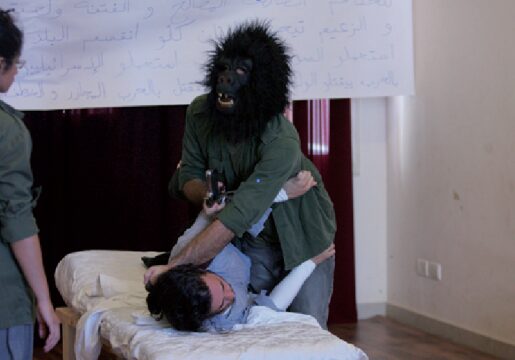
Perform-Autopsy. Zoukak Theatre Collective and Cultural Association, 2012. Photo credit Hussein Baydoun
AK: So by asking questions, would you say a lot of your work is participatory? I am interested in your distinctions between directed action and political performance and your definition of the liminal space between protest and performance. How do decisions about space, people, place, and form of performance get made?
MZ: I think that every performance takes the form that it wants to take in terms of space, aesthetic, and number of actors and so on. So we have done very different kinds of shows.
AK: So you respond to the process that starts from an idea and let it take whatever route it takes. The route is always important in collective processes.
MZ: If you are talking about history it makes sense to talk about it within a space affected by the issue. The form, the number of performers, project leader, and budget all, of course, play a role in a performance. Even though we are a collective, one person leads each project and we give that person all our trust.
AK: I wonder about hierarchy in collective work. Traditional theatre models, and even most collective theatre models, replicate a hierarchical model and depend on a final say by a single author(ity). Hierarchical power relations are culturally prescribed and we have to inhabit them. In terms of Zoukak’s approach to working together, do you feel you are bypassing some of the existing hierarchies? For example, in your decision to work together, how are you able to function in this neoliberal cultural system? It is hard to be doing what you are doing, whether in Beirut or anywhere in the world.
MZ: That is something we have to fight all the time, especially when we work with other people and organizations. I had the experience of working as a director in Germany at a very hierarchical city theatre, where people are not used to questioning the director. The director takes all the decisions – it is so boring. I worked with older actors who were used to the system and who were very good performers but who were not used to thinking through the content in a dramaturgical way. So I really challenged that and gave a voice to the assistant director and was clear about my own uncertainties and of not having answers. It is very creative in an artistic process to not have answers. People are afraid of it – men mostly. I would say it is a very feminine approach to things to not have answers, to see how things go, but of course, at some point, you have to decide. This hierarchy is something that we actively fight wherever we go and when we work with students, too.
Within the company, the power relations depend on whoever is there. There are seven of us in the team now but only five core members creating work. For the first couple of years, our meetings would last seven to eight hours, discussing everything at length but now things take less time. There is a structure and there is respect but it is not only that. It is a great way to live and I am lucky to work with people that I love and respect – it means you can say whatever you want and they can accept it. This is a level of honesty that you might not have even with your family. Then, on top of that, we create interesting work. We are trying to do something together but I do not know if it works all the time. We have a long and established working relationship but also want to recruit newcomers – this is tricky because we have been together for ten years now. We want to expand but how can we integrate more people?
AK: It is tough to create a structure that is able to welcome newcomers and also hold the same working processes as before. Speaking to some artists and performers, I think people do want to work in different, more collaborative, less hierarchical structures and to find other systems, but may not understand the labour involved. We need more models like Zoukak that are doing the work and working successfully. You mentioned that you are thinking of expanding and integrating more people – what are the next steps for Zoukak?
MZ: It is our tenth anniversary this year. We had a rough year last year financially – there was a moment when we thought that we were going to have to close down our studio. We wondered what we were doing, having got to a point where we couldn’t pay the rent. But luckily we have a lot projects coming up, so things are looking good.
Our last show, The Battle Scene (2015), is another shift in the way we work. Since Hamletmachine, we have started doing very text-based works such as Silk Thread, Lucena (2013), Heavens, He Who Saw Everything (2015) and others. With Silk Thread, we wrote the whole show together. It is one hour and 30 minutes of nonstop text using a lot of visual images based on numerous articles and stories. It looked iconic with the use of space, costumes, and imagery. This dense writing style went on in the rest of our work but using even more text and being more overtly political. With our last show, The Battle Scene, we started with 20 minutes of movement – it was a very new thing for us and we integrated younger performers.
AK: Tell me more about this shift in working.
MZ: In Zoukak we work in cycles – we had a cycle on gender, then on history (Perform-Autopsy, Heavens, Lucena) and then death and mortality (He Who Saw Everything, Death Comes Through The Eyes [2015], Organs, Tissues and Candy Games [2014], I Hate Theater I Love Pornography [2015]). This is a new cycle, I guess. We do not know what it is yet but somehow it is a call for action. All of the shows that we have worked on so far, especially with Hamletmachine, had this idea of daring to tell the story as a voice, always positioning ourselves as actors and as witnesses to tell stories. In The Battle Scene, we wanted to be in the action – we were looking for something that was real, not necessarily trying to do body art but trying to negotiate what it means to actually be in the present. The show starts with us putting our heads in water for several minutes in a kind of endurance exercise.
AK: Having visceral experiences.
MZ: Absolutely. So we are questioning how we can be in the action rather than representing or being witnesses to actions that are happening somewhere else and then telling the story. It is starting a new phase in our work – for example, we are working in our locality, integrating more people, and using the space in a different way.
AK: So a shift to the body and movement?
MZ: It is theatre but not necessarily text based. We feel that sometimes you just have to shut up, like in The Battle Scene. And we are thinking about abstraction. I understood abstraction very recently when I was working on a project in Houston. I went to the Rothko Chapel in Texas and I saw so many abstract works together at the same time. I began to feel the history of it and the necessity of this kind of work. When you are there you begin to understand where it came from and the moment after the war in which it was made. After what we have experienced here, we cannot say things anymore, so this shift to the body makes a lot of sense. With the horrible things that are happening around us in the region, it’s about speaking less and having more abstraction. I think I understood that when I went to the Rothko Chapel and being there surrounded by the dark paintings – we do not need to say anything else.
Zoukak Theatre Company and Cultural Association is based in Beirut and was established in 2006 from a belief in collectivity as a position against marginalizing systems and practice as a political and social involvement and action. Their methodology of work emphasizes processes of creation rather than outcomes. For the members of Zoukak, collaboration lifts the creative process to a higher level, and allows for unexpected approaches to theatre-making, while providing a more horizontal participation in decision-making and a multiplicity of expression. Since Zoukak’s inception and with each new project, they have worked to find new ways of collective creation, springing from their understanding of theatre as collective work done by diverse individuals. Over the years, Zoukak has applied theatre on various levels – social, psychological, and educational – giving workshops and training sessions and devising performances in different Lebanese regions and in various contexts, finding ways to connect social interventions with artistic investigations.
Maya Zbib is a theatre director, performer, writer and founding member of Zoukak Theatre Company. Her work including The Music Box (2008) and Silk Thread (2012) has been shown at international festivals and venues including London, Amman, New York (New York Public Library), Williamstown (Williams College), Istanbul, Alexandria, Marseilles (MUCEM museum), Kerala (ITFOK), Houston (CounterCurrent Festival), and in villages and cities across Lebanon. Since 2008, Zbib leads psychosocial interventions with Zoukak in marginalized contexts in different Lebanese regions. She facilitates collaborations, artistic residencies and events with international artists in the company’s studio where she co-curates since 2013 Zoukak Sidewalks, a year-long international performance platform.
This article was first published on www.ibraaz.org. Reposted with permission of the publisher. To read original article, click here.
This post was written by the author in their personal capacity.The opinions expressed in this article are the author’s own and do not reflect the view of The Theatre Times, their staff or collaborators.
This post was written by Amal Khalaf.
The views expressed here belong to the author and do not necessarily reflect our views and opinions.

